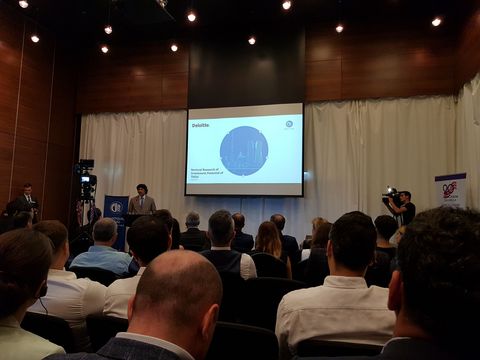Sectors & markets
Sectorial Research of Investment Potential in Tbilisi

Hospitality/ Healthcare/ Pharmaceutical/ Retail and entertainment/ BPO
Sectorial Research of Investment Potential in Tbilisi
11 June 2019
The conference on Sectorial Research of Investment Potential in Tbilisi was organised by the American Chamber of Commerce in Georgia “AmCham” in collaboration with the Tbilisi City Hall. The Tbilisi City Hall requested a study on the investment potential of the city.
The aim of the conference was to determine the sectors with the biggest potential in Tbilisi and thus to support the economic development of the capital city. The goal is therefore to increase the investment in the sectors with opportunities in order to develop them on a sustainable and long-term.
The representative of Deloitte Georgia reviewed the potential of the city. They identified 11 sectors and 5 of them were selected to be studied in depth.
The study was conducted in 5 stages:
- Analysis of the existing economic sectors (about Tbilisi, Economic indicators, Labour market, Doing business)
- Identification of prospective economic sectors in Tbilisi (Hospitality, Healthcare, Pharmaceuticals, Retail & Entertainment, Creative)
- Identification of prospective economic sectors in the region (Czech Republic, Ukraine, Turkey, The Republic of Belarus, Slovakia)
- Analysis of prospective economic sectors in comparable cities (Prague, Lviv, Istanbul)
- Findings and recommendation of the research. (Infrastructure, Human Capital, Strategy)
To demonstrate the potential of the city, the representative of Deloitte exposed an overview of Tbilisi. They positioned Tbilisi as an economic center and a hub in the region explaining that many companies settled their headquarters in the country and mentioning that it is very easy to make business in Georgia and it is cost effective.
Hospitality sector
The first sector studied was the Hospitality Sector and is considered as the pillar to a self-reliance economy. The opportunities in this sector are the development of the MICE tourism (meetings, incentives, conferences and exhibitions) and of wellness resorts. Georgia hosted 9 million of international visitors in 2018 and the city hotel accommodations have a 65% occupancy rate.
However, the challenges in this sector are that most popular touristic hotspots are congested and that the average stay of tourists is short (1-2 days).
Recommendations:
Deloitte recommends to the city hall to diversify tourism offers, to develop a brand for the city to attract investments in tourism and to improve the average dollar spent by tourists during their stay.
Healthcare sector
The healthcare sector is a “surprising” opportunity for Georgia. Georgia inherited of a strong healthcare base and of a system from the Soviet Union. It attracts medical tourists from Middle East for plastic surgeries and is developing a medical tourism for in vitro fertilisation and bacteriology.
The challenges are the low quality of inpatient services and the limited investment in R&D and in innovative healthcare treatment.
Recommendations
According to Deloitte, the government needs to prepare infrastructures and human resources to serve international patients and promote all-inclusive packages to attract more medical tourists.
Pharmaceutical sector
This is an important sector in Georgia as there are more than 80 key pharmaceutical companies represented in Tbilisi and the pharmaceutical sales totaled to 419 million USD in 2017 in Georgia. Deloitte is forecasting for this number to reach 582 million USD by 2022.
The opportunities in this sector are mainly the lack of price regulations and the non-regulated market. But also the high mark-ups, the R&S niche in Bacteriophages and the potential of a manufacturing hub.
However, it is difficult to register and approve medicine, there is an absence of Good Manufacturing Practice (MGP) standard and there is also limited finances for R&D.
Recommendations
The government should therefor relocate and cluster the production facilities and promote Georgia’s expertise in Bacteriophage and support its wider use.
Retail and entertainement
As of today, Tbilisi is counting 54 museums, 6 cinemas, 24 theaters, 1 zoo and 14 gyms.
In order to improve economic development, people need support in spending money and entertainment 24/7. Georgia has low barriers to entry, low corruption rate and no protectionism which represent a great potential. This sector growth is fueled by Advertising industry and Fashion and Sewing
Yet it has a small size market and the existing retail stores are reluctant to establish e-commerce, which is why there is a need to create and develop courses and programs in educational institutions, as well as to create a new sustainable hub by promoting Georgian cinema for example, promote products made in Georgia and sustainable development-oriented goods.
Recommendations
The recommendations are to develop courses and programs at educational institutions, to nurture the creation of international brands and to promote products designed and produced in Tbilisi
BPO sector
The last potential economic sector is the Business Process Outsourcing sector. Georgia is considered to have a high potential in the sector to become a popular destination for BPOs because of the ease of doing business. That potential is confirmed by its lower labor costs, a time-zone similarity, and the language skills of the workforce. It also has a cultural and physical proximity to Western Europe
Findings and recommandations
To conclude, the key priorities for improving the population’s quality of life are to invest in human capital. For Businesses, priorities are to evaluate perspectives in terms of short-term and long-term. Growth targets have to be set in terms of sectorial development. For market conditions, priorities are to evaluate and anticipate industry drivers.
Recommendations:
Human capital: Develop joint educational institutions, develop technology transfer office, Establish partnerships between the city government and business community.
Infrastructure: Improve public transport network, formally prioritize car-free zones and develop citywide infrastructure plan.
Strategy: Balance quality of life and economy development, set up clusters, foster cooperation between public and private institutions.


